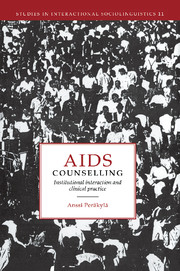Book contents
- Frontmatter
- Contents
- Preface
- Transcription conventions
- 1 Introduction
- 2 Quasi-conversational turn-taking
- 3 The client as owner of experience
- 4 The management of co-counsellors' questions
- 5 Some interactional uses of co-counsellors' questions
- 6 Addressing ‘dreaded issues’
- 7 The interactional power of hypothetical questions
- 8 Conclusion
- Appendix: the data base
- References
- Index
6 - Addressing ‘dreaded issues’
Published online by Cambridge University Press: 02 December 2009
- Frontmatter
- Contents
- Preface
- Transcription conventions
- 1 Introduction
- 2 Quasi-conversational turn-taking
- 3 The client as owner of experience
- 4 The management of co-counsellors' questions
- 5 Some interactional uses of co-counsellors' questions
- 6 Addressing ‘dreaded issues’
- 7 The interactional power of hypothetical questions
- 8 Conclusion
- Appendix: the data base
- References
- Index
Summary
One of the central tasks of AIDS counsellors – regardless of their theoretical orientation – is to help clients to come to terms with the uncertainty of their future. In pre-test counselling, counsellors have to prepare the clients for a possible positive test result; and in counselling with HIV-positive patients, they have to help the clients to live with the knowledge of prospective illnesses and a shortened life-span.
Counsellors at the Royal Free Hospital have particularly emphasized the importance of this aspect of their work. They have pointed out that AIDS counsellors face three therapeutic options in dealing with the clients' fears and worries concerning their future (Bor and Miller 1988). One of these is to reassure the client that everything will be all right with him or her. In that case, the counsellor will probably collude with the patient's denial of the severity of the problem. The second option is to wait until the patient has developed symptoms related to AIDS and counsel him or her at that point. In such situation, however, the patient and those close to him or her can be unprepared for the ‘bad news’. They are likely to be ‘resistant’ to any intervention by the counsellor. The third option, favoured by the counsellors at the Royal Free Hospital, is to ‘use hypothetical and future-oriented questions at the right moment with patients while they are still relatively well’ (Bor and Miller 1988: 401).
A central part of AIDS counselling based on Family Systems Theory is to facilitate talk about the clients' fears concerning their future.
Information
- Type
- Chapter
- Information
- AIDS CounsellingInstitutional Interaction and Clinical Practice, pp. 232 - 286Publisher: Cambridge University PressPrint publication year: 1995
